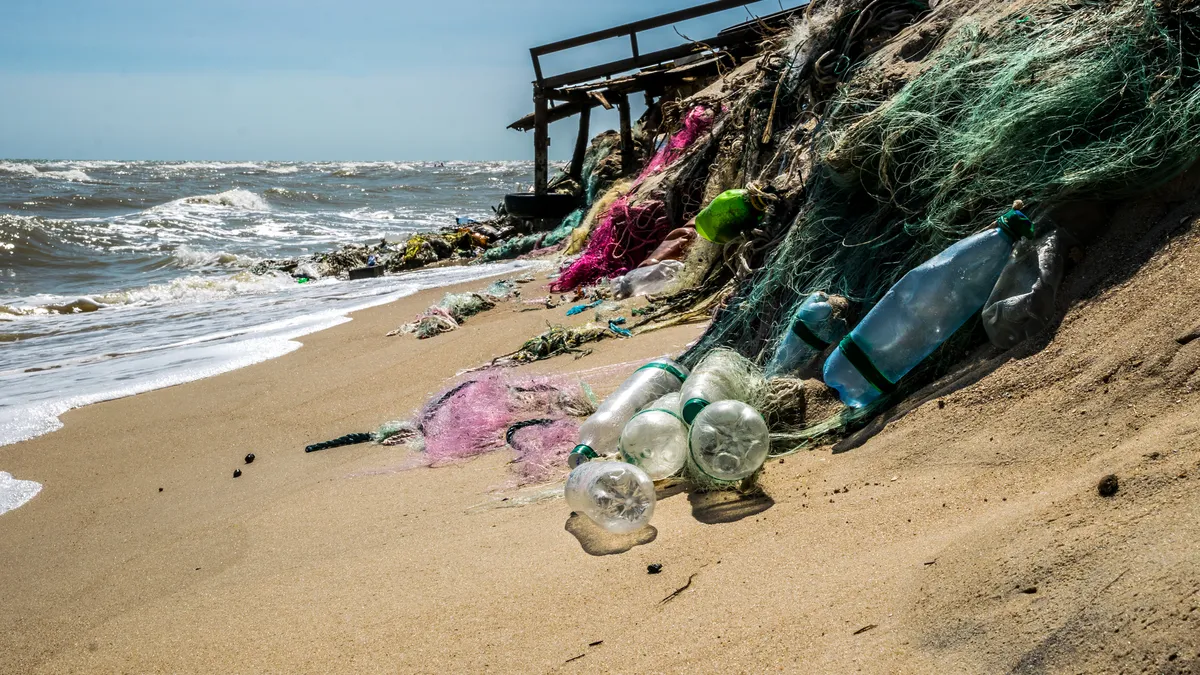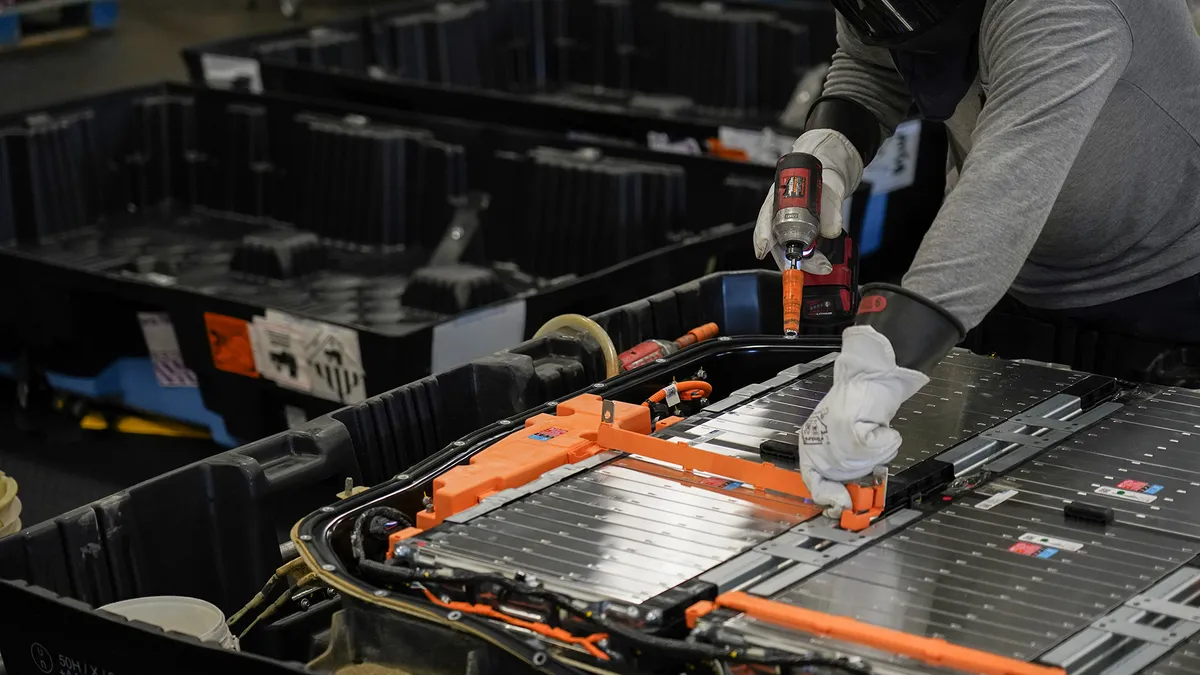Supporters of SB 54, a bill to create an extended producer responsibility program in California for plastic as well as printed paper and packaging, are racing the clock to pass the bill. Their goal: to convince the backers of a competing ballot measure to withdraw their proposal by a June 29 deadline.
Those that back SB 54, including lawmakers, recycling industry representatives and major waste companies including Republic Services, say the bill is the most comprehensive and stakeholder-friendly initiative that can hold producers responsible for plastic pollution. They also argue it offers stronger franchise protections for haulers and MRFs, which historically have been wary of previous versions of the bill for giving too much control to producers. State Sen. Ben Allen sponsors the bill.
SB 54 already has years of intense scrutiny and baggage attached to it: Previous iterations were tabled or failed to pass in 2019, 2020 and 2021 due to fights between competing interests. The 2019 and 2020 versions of the bill garnered support from both Republic and Recology, while WM opposed the measure in prior years.
This year, SB 54 is facing extra competition from a ballot measure known as the California Recycling and Plastic Pollution Reduction Act, which has some similar goals but a different approach to improving recycling and reducing plastic pollution. The ballot measure would require single-use plastic packaging and foodware to be recyclable, refillable, compostable or reusable by 2030. It would also call for reducing single-use plastic packaging and foodware sold into the state by 25% by 2030. It would ban polystyrene food packaging and require plastic producers and distributors to pay a 1-cent fee per item, with the money going toward waste and recycling efforts such as infrastructure or pollution abatement.
Supporters of the ballot measure include the Nature Conservancy and other environmental organizations, who say their initiative is more straightforward, sets earlier timelines for source reduction and directly bans polystyrene. In contrast, SB 54 sets a required 25% recycling rate for expanded polystyrene containers by 2025, according to a recent bill amendment, which supporters view as a phase-out of the resin because they see the threshold as unattainable. The bill previously called for a 20% rate by 2025.
To remove this measure from the ballot, SB 54 would need to pass the Assembly and the Senate by June 29. That’s because the petitioners of the ballot initiative would need to agree to rescind the measure 130 days before the election, which is set for Nov. 8. This deadline is specific to the bill, as California’s legislative session does not end until August. Sen. Allen’s staff did not respond to requests for comment as of press time.
Michael Sangiacomo, former Recology CEO and one of the three ballot initiative petitioners, said in a Friday statement (shared by a Los Angeles Times reporter on Twitter) that he believes “we are very close to a deal” with bill authors but said he could not agree to the expanded polystyrene measures in the bill.
"Expanded polystyrene needs to meet a minimum of 50% recycling rate by 2025, for me to support the withdrawal of the ballot measure. If the legislation cannot accomplish this reasonable compromise, then the voters will decide this issue in November," he said.
SB 54 backers expect the bill to be considered this week in the Assembly Committee on Natural Resources, where it must successfully pass through in order to survive. Other legislative delays, such as prolonged debates or numerous amendments, could also slow down the process and threaten its extremely tight deadline, said Heidi Sanborn, executive director of the National Stewardship Action Council and a supporter of the bill. “The bill is so complex, and people haven’t had a lot of time to get their arms around it,” Sanborn said.
If passed, SB 54 could be the most sweeping EPR law in the country. Given the state’s influence on national recycling and packaging policy, it could have ripple effects in the industry, Sanborn added.
What’s in this year’s bill?
This year’s version of SB 54 would create an extended producer responsibility program for printed paper and plastic packaging. A producer responsibility organization would be responsible for collection and recycling with oversight from the state.
The bill requires a 25% reduction in single-use plastic packaging and foodservice products by 2032 and calls for a 65% recycling rate by the same year. At least 10% of the source-reduction efforts would need to be achieved through eliminating single-use plastic, with 4% specifically though reuse or refill systems. The program would include eco-modulated fees, meaning producers could pay a penalty for using hard-to-recycle or hazardous materials in their packaging or get a credit for using more sustainable, right-sized or reusable packaging.
The bill also has an environmental justice aspect that sets up a plastic pollution “mitigation fund” to address existing and historical environmental and health impacts caused by plastic pollution. That charge to the PRO would start at $500 million a year over 10 years, with 60% going to projects in disadvantaged, low-income and rural communities. It also directs the PRO and CalRecycle to avoid disproportionate impacts on disadvantaged and low-income communities when creating and implementing regulations.
Haulers weigh in
Among the issues for haulers and processors in the past was trepidation that a new EPR model could take away their operational or contractual control. Sanborn said the latest version of the bill allows haulers and MRF operators to negotiate with the PRO over details such as collecting a certain type of material or meeting new or bespoke specifications. The PRO would not have the ability to mandate anything from MRFs and haulers and would ultimately be responsible for funding many infrastructure or quality improvements, she said.
“The haulers have always said they don't want the manufacturers of anything telling them how to run their business or get in the middle of their contract,” she said. “They’re saying, ‘if you want us to collect more stuff or get it cleaner, then you need to give us the money to go invest in the equipment and all the other things necessary to do that.’”
Major haulers such as WM and Republic have been “instrumental” in the stakeholder process for this version of the bill, Sanborn said. Others familiar with the bill process say some of the state’s smaller haulers are waiting to see if the bill will successfully pass before making their own opinions known.
A WM spokesperson said the company was reviewing recent amendments to the bill that “could alter our previous support.” Though WM did not identify which amendments, the spokesperson said “WM supports reduction of single-use plastic packaging and products in California, but we must ensure that the state’s critically important curbside collection system and recycling processing infrastructure is not negatively impacted.”
In a letter of support for SB 54, Chuck Helget, Republic’s director of government affairs for its West and Southwest regions, said hard-to-recycle single-use plastics have contributed to contamination in MRF streams and led to higher operating costs. SB 54 helps steer those costs to packaging producers and away from residential and commercial ratepayers, he said.
Helget acknowledged in the letter that the bill will require infrastructure or market improvements to meet the bill’s goals, but he underscored that such improvements will be achieved “through a process of collaboration and consent between recycling service providers, local governments, CalRecycle, and the producer responsibility organization.”
In an emailed statement, a Republic spokesperson added that the process of writing and moving SB 54 through the legislature “has been very deliberative and continues to evolve… We understand that additional amendments are being developed, and we are waiting to review those new amendments” before making further comments.
Recology has supported previous years’ versions of SB 54, but in 2020 it spent about $3.84 million to get the ballot initiative on the books, in part because SB 54 was not gaining traction. The company has since stepped back from any direct campaigning, according to Resource Recycling. Robert Reed, a spokesperson for Recology, said the company had no comment on the bill.
Other supporters of SB 54 with a stake in collection or processing include local governments such as the city of Encinitas, which see the bill as a way to help reduce local pollution. “A reduction at the source is the most efficient means of reducing plastic pollution and the unfortunate harm experienced by communities,” said Encinitas Mayor Catherine Blakespear in a letter.
Opposition over EPR model and more
Some opponents are not convinced that SB 54, as written, will be enough to protect recyclers’ and environmentalists’ interests.
In a letter from Californians Against Waste, the Natural Resources Defense Council and the Sierra Club of California, these opponents said they have been “among the staunchest supporters” of the bill since 2019, but they have now withdrawn their support over concerns that the proposed EPR model gives too much power to producers.
The groups also say the bill does not focus enough on improving additional pollution-reduction methods, such as bans, deposits, or recycled-content mandates.
The American Forest & Paper Association, which opposes the bill mainly because it says it will harm paper recycling rates, said during a press call yesterday that its members who operate a dozen MRFs in the state are also concerned with the PRO model’s impact on operations. Terry Webber, AF&PA’s vice president of industry affairs, said the bill shifts focus toward a central “command and control” system and away from the state’s currently localized systems. “It goes a lot farther than any other EPR program currently in place in North America,” he said. AF&PA has opposed EPR in other states, including in Colorado, which passed its law in May.
The debate over such EPR models comes as no surprise given rising interest in such programs and newly-passed EPR laws in the last few years, including ones in Oregon, Maine and Colorado, said Nick Lapis, director of advocacy for Californians Against Waste.
“SB 54 is a microcosm of this bigger fight in the U.S. around EPR,” he said. “Do we go down the road of Canadian, European EPR? Or do we stick with having regulatory agencies in charge?”
This story has been updated to reflect a recent bill amendment and include comments from WM, Michael Sangiacomo and Recology.



















